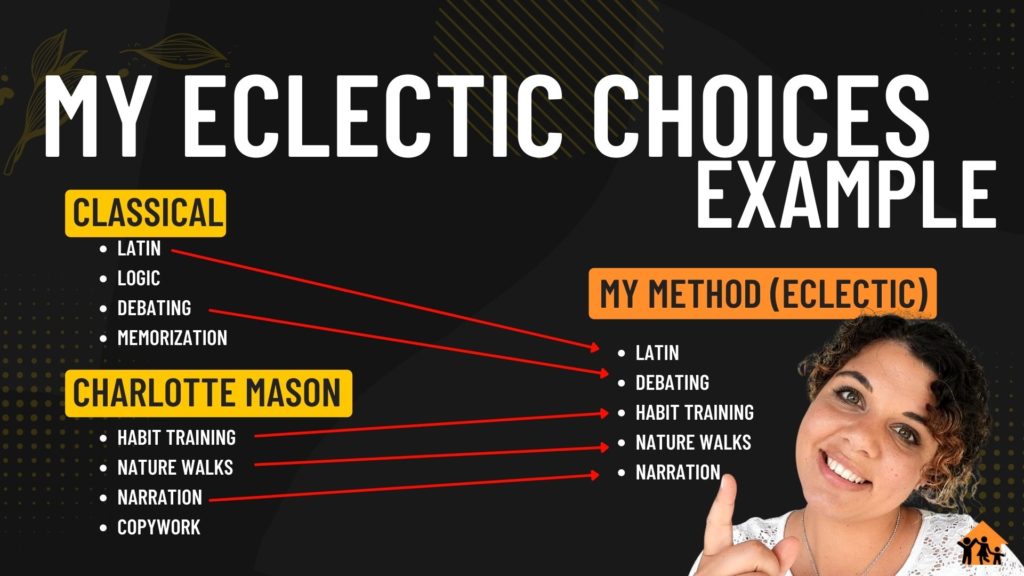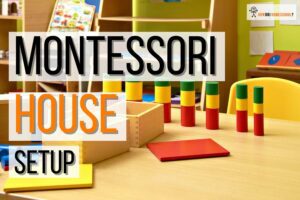Suppose you haven’t wanted to commit to a particular educational philosophy because you like so many things about so many different methods. In that case, chances are you’re using the relaxed eclectic homeschooling method. Many home educators want to remain flexible and don’t want to be tied down to a set curriculum or educational approach. For this reason, they choose this relaxed method which you might find suits your homeschool also.

I hope you enjoy reading this blog post. If you want to do my course on how to homeschool, click here.
Relaxed home educators have it made. After all, they just do the parts of the curriculum that they like and disregard the rest. But, can you really do that and give your children an excellent education?
It’s easy to think that we need to make our children complete a certain number of hours in the textbook or do every page on the curriculum that they’re using. However, the relaxed method says to ‘keep it simple.’
Keeping it simple (like this teacher turned homeschool mom did) has several advantages. It reduces stress in your homeschool and keeps the learning environment light, and, therefore, promotes interest-based-learning, which increases motivation.
These are certainly advantages, but this method has some possible disadvantages. I say possible as the main disadvantage is related to personality.
That is, people who love flexibility in their lives can live without a completely structured curriculum. However, those who rely on structure and box-ticking may find this method far from relaxing.

NB: If you’re interested in taking a HOMESCHOOL STYLE QUIZ to quickly identify if the eclectic method is the right one for you, you can do that at this link.
What is Eclectic Homeschooling?
Eclectic homeschooling is a medley of different educational approaches. You can pick and choose the parts of this method you love and discard the elements you dislike. Here are some of the other methods families might use in their eclectic home school:
- Traditional (School-at-home)
- Classical
- Charlotte Mason
- Steiner/Waldorf
- Unschooling and the
- Montessori approach.
There are other approaches to homeschooling, but the ones above are the main ones used today.
An Example of the Eclectic Homeschool Method
A great example of eclectic homeschooling is choosing classical education elements you love. If you think your children will benefit from debating skills, but you don’t think they should read giant Greek tomes or learn Greek or Latin, you can do the former and forget the latter tenets of this type of education.
You can fill the spare time they would have spent learning Greek by doing nature walks or reading living books (both core elements of Charlotte Mason education).
School Inflexibility vs. Homeschool Flexibility
Often, parents choose to homeschool because they want a little more flexibility in their family’s life. Perhaps you have a child with special needs, and you’ve decided the school system isn’t giving them what they need – so you homeschool, hoping it will provide them with more freedom.
This freedom is hard to come by if you are locked into a rigid curriculum that doesn’t allow wriggle-room.
Homeschools can add more flexibility to their schedule as they don’t have to waste time as schools do in busywork (and the eclectic method allows you even more flexibility within your homeschool). That is, schools can’t always make children do constructive work all day long.
They cannot do this for many reasons:
- most children can’t concentrate for that long, especially if the material is delivered in the traditional way it is in many schools today
- substitute teachers often don’t know the material being taught, so they pad the day out with busywork – work that doesn’t benefit students
- other children misbehaving means well-behaved students spend much of their time twiddling their thumbs while the order is restored
- review work is set to benefit the slowest child the most; bright children become frustrated as they do the unnecessary review work
Busywork is inbuilt curricula fluff to pad a curriculum out. It wastes brilliant minds on monotonous, tedious tasks, eventually killing the natural love of learning every child starts school with.
And this is where eclectic homeschooling enters like a knight in shining (un-fluffy) armor. It allows you to say, ‘No more fluff today. Let’s do something constructive!’
Why Love Eclectic Homeschooling
Relaxed eclectic homeschooling lets parents have flexibility in their routines and their children’s curriculum. This flexibility allows you to better adapt to the peculiar learning preferences you notice in your children.
For example, if you notice your children learn well using a particular program, but they don’t seem to respond to how that program teaches mathematics, you can use a different method to teach them math.
Children with giftings, special, or other learning needs respond particularly well to the eclectic method. It allows them time to spend on areas they want to spend more time on and allows them time to stop formal education when they need to.
For example, if a gifted child wants to spend extra time on an entrepreneurial pursuit, they can allocate the time accordingly. If a child with disabilities needs to spend a few weeks recovering from a bout of sickness, they can stop their work when they’re sick and resume it when they’re feeling better.
Eclectic Homeschooling Is Less Stressful for Homeschool Moms
Sitting back, relaxing, and going with the flow will always be less stressful than trying to do absolutely everything.
Some homeschooling curriculum packages are impossible to finish, and you’ll stress out yourself and your child if you make them try to do it.
You’ll both begin to feel like you’re drowning and question whether home education is the right choice for your family.
One of the top causes of stress for a homeschool mom is trying to replicate traditional school in their loungeroom (this is called traditional homeschooling, and I recommend caution if you use a curriculum that employs this method.)
While there’s nothing wrong with a traditional curriculum (in fact, I’d recommend it for new home educators), you don’t have to cross all your i’s and dot all your t’s if you use them.
Just make sure your children have learned the concept, and then go out and play for the rest of the day.

Eclectic Homeschool Curriculum Packages
You’re not the only one who loves the idea of an eclectic homeschool curriculum.
There are many people who love a mix of the methods. And so, several companies have joined their favorite mix of various homeschool approaches to form an eclectic homeschool curriculum including:
- My Father’s World – Classical + Charlotte Mason + Unit Studies
- Tapestry of Grace – Classical + Charlotte Mason
You can check out reviews of these eclectic programs on the links above.
Conclusion
The relaxed eclectic homeschooling method is an excellent choice for many families. It allows more flexibility than one might have if they were committed to studying a specific curriculum using a particular method. It also allows parents to choose the bits they love out of their favorite curriculum and include bits from other curricula they like. It gives gifted, disabled, and special needs children flexibility they rarely find in schools. It cuts through the fluff and reduces busywork. And that’s why many people choose relaxed eclectic homeschooling!



